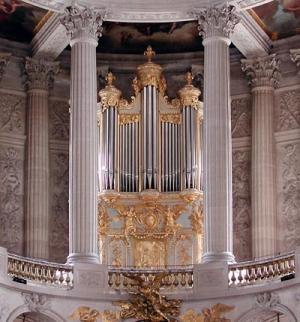

Versailles, Chapelle Royale

Clicquot 1711
State of preservation: restored by Boisseau & Cattiaux 1995
The organ of the Chapelle Royale demonstrates, how far the sound impressions of French organs were rooted in the Grand Orgue. All the other divisions serve melodic solo purposes in contrast to the Grand Jeu. The Grand orgue unites the Plein Jeu (plenum of diapasons), supplemented to Grand Jeu with trumpet reed stops and its own solo stops for Cornet und „Dessus“ (treble) registrations, the Positif as a reduced image of the GO containing the already indispensible solo stop „Cromorne“. Recit and Echo correspond in a similar way while the pedal has its function of giving slow cantus firmus parts of middle or low range.
Music sample
Francois Couperin (1668-1733) : Trio Les dessus sur la tierce et la basse sur la trompette
played by Michel Chapuis
Specification
IV+P
Grand Orgue:
Bourdon 16’
Montre 8’
Bourdon 8’
Cornet [8’] 5f.
Dessus de Flute
Prestant 4’
Grosse Tierce 3 1/5’
Nazard 2 2/3’
Quarte 2’
Tierce 1 3/5’
Fourniture 4f.
Cymbale 4’
Trompette 8’
Voix humaine 8’
Clairon 4’
Positif:
Montre 8’
Bourdon 8’
Prestant 4’
Flute 4’
Nazard 2 2/3’
Doublette 2’
Tierce 1 3/5’
Larigot 1 1/3’
Plein Jeu 6f.
Trompette 8’
Cromorne 8’
Recit:
Trompette 8’
Hautbois 8’
Cornet [8’] 5f.
Echo:
Bourdon 8’
Flute 4’
Cornet
Voix humaine [8’]
Pedale (P):
Flute 8’
Flute 4’
Trompette 8’
Clairon 4’
© Greifenberger Institut für Musikinstrumentenkunde | info@greifenberger-institut.de



